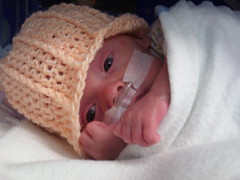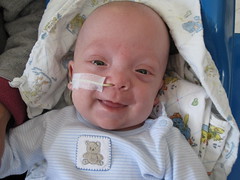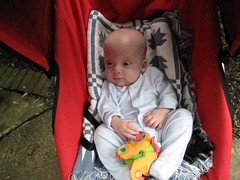Max's nurse told Carolyn this morning that we needed to get Max home before one of his growing court of admirers pulled a "code pink" and ran off with him. (Note--this is a joke. Security is really tight at HSC.)
Carolyn arrived this morning in time for a back-to-back PT/OT session, held in the playroom. All told, Max got in more than an hour of grueling therapy. The current thinking is that he is definitely favoring his left side; the danger is that he might lose the ability to turn his head to the right, because it is often flopped over to the left. Carolyn thinks that Max is doing a little better on his head control. We have both noticed, however, that he seems to have forgotten some his tricks--he no longer turns his head from side to side during tummy time, for example. The physical therapist said that this was not uncommon, and that it was okay for Max to forget some skills as long as he was trying to learn new ones.
This dictum that "forgetting while learning is okay" struck me as carrying value outside the narrow world of physical therapy. It joins a few other sayings that, to me, seem to apply far beyond their original settings. For example, consider the standard assurance at day care given to nervous children: "Mommies always come back". Or, more mystically, the parking signs in Arlington that read: "Any may park, all must pay".
Max did extremely well on his bottle feeds today, taking 25 ccs or more at each feeding. It's useful to consider that, while on his very best day, Max might take 90 ccs all told by bottle, he gets more than 650 ccs overnight. Bottle feeding is more of a hobby for Max than a serious way to get nutrition into him. He will be on some kind of tube for a long time to come.
Carolyn asked for a family meeting tomorrow to discuss the HSC's plan for getting Max home. Unlike other family meetings, which have typically been about assessing Max, or a way for the NICU team to deliver bad news, we hope tomorrow's meeting will be more forward-looking. We feel, perhaps incorrectly, that we know as much as there is to know about Max's problems, and we'd like to understand how we're going to get him home.
skip to main |
skip to sidebar

Max was born in October 2008 at Georgetown University Hospital. After more than four months at GUH, Max moved to the HSC Pediatric Center in March 2009. He came home six months after he was born, in April 2009.
A TUBE-FREE MORNING

Start Here: A list of posts with background information
- We're home! (leaving the hospital with Max)
- The hospital at home (what it's like to care for Max at home)
- Max in action (see Max do his tricks)
- How is Max? (update April 2009)
Most recent photos of Max
Blog Archive
-
▼
2009
(224)
-
▼
March
(39)
- Max, smiling
- Why don't we like orphanages
- Learning and forgetting
- Max at night
- Bath day, take two
- Bath day
- Max sleeping like a baby
- Max studies swallowing
- Going to Children's
- Max's big week continues
- Max's car ride to Children's
- Reminders from Georgetown
- Max too will ride the helter-skelter
- Max's new room
- Trip to the playroom
- Dr. Brown's Patent Medicine Bottle and Baby Soother
- Max catches a fish
- No "A" for effort
- Visiting day at HSC
- Blast from the past
- Carolyn passes the CPR test
- A quiet day
- CPR training video
- Shaky video day
- Laundry day at HSC
- Riding the 'J' train
- First family meeting at HSC
- Max's charm offensive begins
- HSC: Who, Where, What
- Everyone wants to blame the head
- First full day at HSC
- Graduating from the NICU
- The long good-bye
- Without a feeding tube
- Without a feeding tube
- Evening Update (3/3)
- Evening Update (Monday 3/2)
- Max taking a bottle
- Evening update (Sunday 3/1)
-
▼
March
(39)



